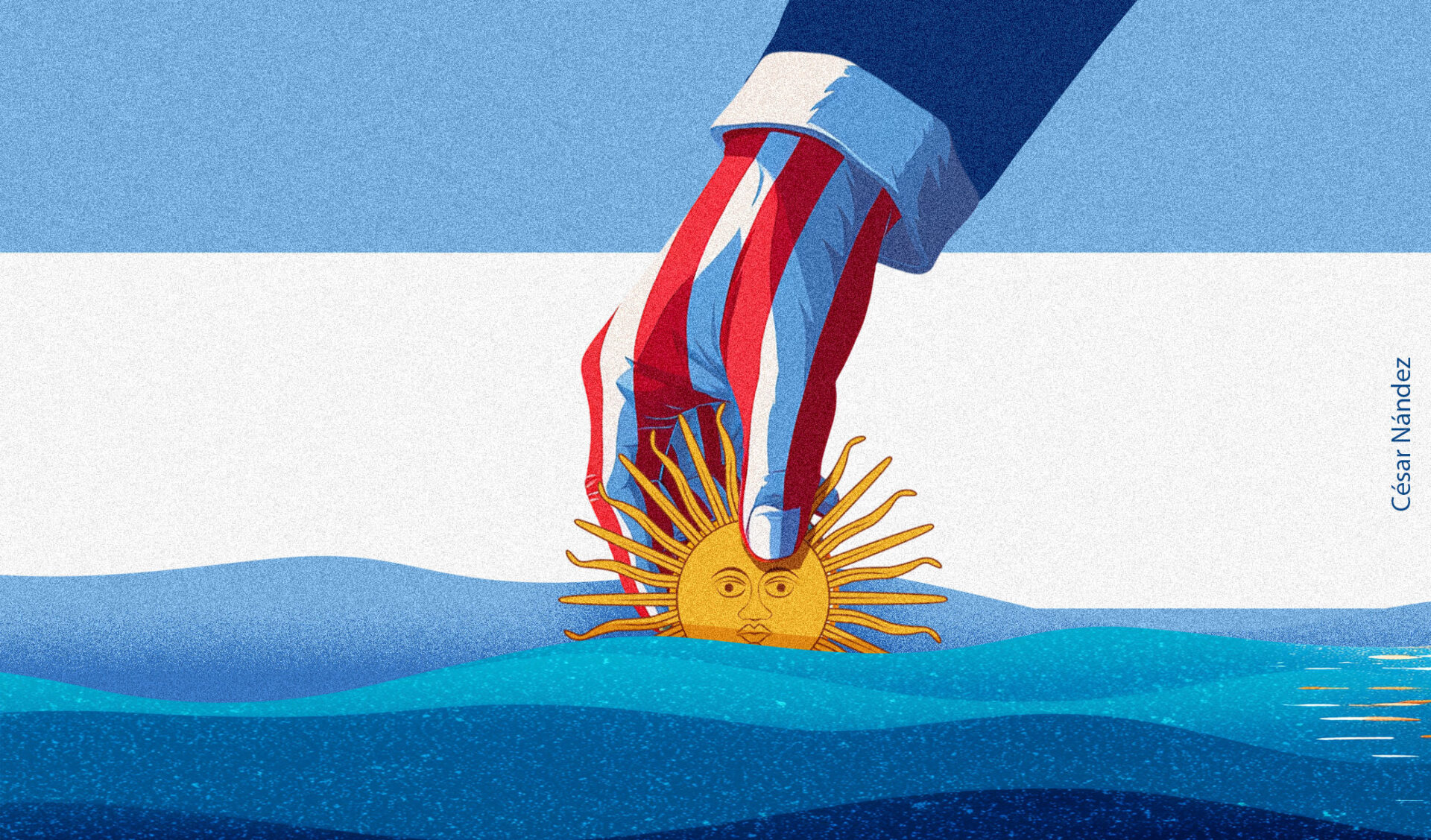When Javier Milei took office in December 2023, brandishing a chainsaw as a campaign symbol, he promised nothing less than a libertarian revolution. An outsider to traditional politics, he declared war on an overextended Argentine state, pledging to cut ministries, privatize industries, dollarize the economy, and slash social spending to the bone. He even proposed abolishing the central bank. Many libertarians and cryptocurrency enthusiasts around the world welcomed his rise as the long-awaited dawn of anarcho-capitalism in power: a real experiment in turning radical free-market theory into national policy, inspired by Joseph Schumpeter’s concept of “creative destruction.”
From the outset, Milei reinforced his global image. He dissolved the Ministry of Women, Genders and Diversity, threatened to remove femicide from the penal code, and attacked gender parity in politics. At Davos, he launched a fierce critique of “wokeism,” lumping together feminism, diversity, inclusion, equity, abortion, environmentalism, and gender ideology under one “woke ideology” to be fought. Mapuche women—members of one of Argentina’s largest Indigenous groups—denounced an increase in racist and misogynistic attacks.
For conservatives from Washington to Budapest to New Delhi, this was electrifying. Abhijit Iyer-Mitra, a propagandist aligned with Modi, praised Milei alongside Elon Musk’s failed Department of Government Efficiency (DOGE), seeing in both an attack on the welfare state and on the enemies of cultural traditionalism. In Milei, the global right found not just another politician but a standard-bearer of its dream to fuse libertarian economics with cultural radicalism.
Less than two years later, the contradictions of his project are exposed. Reserves are depleted, household incomes stagnant, unemployment high, and public confidence eroded. Argentina remains trapped in crisis, repeating old cycles. History warns us: Carlos Menem left massive debts and unemployment despite two terms between 1989 and 1999; Fernando de la Rúa resigned amid collapse; Cristina Fernández de Kirchner governed with growing subsidies and controls; Mauricio Macri faced a currency crisis in 2018 despite IMF support.
In remarkably similar fashion, Milei’s political standing has weakened. His party’s defeat in Buenos Aires provincial elections in September, coupled with corruption allegations against his sister and closest adviser, has undermined his authority. Congress overturned one of his vetoes and is preparing to challenge others. The peso, already fragile, brushed critical levels as it approached breaking the IMF’s stipulated currency band. On September 17, it crossed that threshold, trading at 1,475 per dollar, forcing the central bank to spend nearly $1 billion in reserves to defend the currency. Country risk soared, and fears of collapse grew.
Then came an extraordinary intervention. On September 22, minutes before markets opened, U.S. Treasury Secretary Scott Bessent wrote on X: “Argentina is a systemically important ally for the United States… all stabilization options are on the table. Argentina will be great again.” He suggested Washington might use swap lines, direct currency purchases, or the Exchange Stabilization Fund to buy Argentine debt. Markets responded: Argentine bonds rose six cents to 71 cents on the dollar, the peso strengthened 4%, and stocks climbed 6%. Panic gave way to relief.
Days later, at the UN General Assembly in New York, Milei appeared alongside Trump and Bessent. Trump praised him for “cleaning up Argentina’s mess” and hinted at support for 2027, though he downplayed the idea of a bailout. For Milei, it was vindication: ideological affinity with Trump translated into tangible backing. But the irony was striking. A president presented as an anarcho-capitalist crusader was rescued not by markets but by the most interventionist state actor of all: the U.S. Treasury, through a classic government bailout. This echoed how Musk’s DOGE and chainsaw rhetoric ended in farce—like Liz Truss’s mini-budget in the UK or the collapse of Lehman Brothers.
Milei’s libertarian revolution increasingly resembles a recycled continuation of Argentina’s old failures. Like his predecessors, he burns through reserves, begs for Washington’s support, and claims credit for temporary inflation drops. His promise of “creative destruction” has not rebuilt the productive base, spurred innovation, or repaired the social fabric. It has merely redirected Argentina’s dependence outward, making the country once again reliant on foreign sponsorship.
Trump’s support adds another paradox. For a leader who proclaims “America First,” rescuing Argentina seems inconsistent. But geopolitics explains it. With Washington straining ties with middle powers like India and Brazil, and regional powers like Colombia leaning toward Beijing or Moscow, Argentina stands out for aligning firmly with the United States. Milei has echoed Trump on Cuba, Venezuela, and U.S. wars abroad, even calling for the demolition of the Al-Aqsa mosque in Palestine—the third holiest site in Islam—“to bring the Messiah.” In return, he receives dollars and political backing. What is presented as libertarian solidarity is, in reality, a geopolitical transaction.
But the deal only postpones the inevitable. Argentina faces midterm elections on October 26, and Milei’s weak performance in Buenos Aires suggests a possible Peronist resurgence. Investors are uneasy not only about the elections but also about his longer-term prospects in 2027.
Some problems are structural, such as Argentina’s chronic dependence on the U.S. dollar. Anchoring the peso creates a dual economy—one domestic and one dollarized—that leaves the currency overvalued and prone to collapse. Abandoning the peg has proved just as destabilizing. When Milei briefly allowed the peso to float, confidence collapsed, inflation surged, and recession deepened. He soon had to revert to a peg-like scheme, defended with borrowed reserves. Argentina remains trapped: pegging drains credibility and reserves, while floating exposes the economy to immediate collapse.
Inflation has fallen under Milei, from nearly 300% in 2024 to around 30% today. But at an enormous cost: sharp cuts in education, infrastructure, and welfare have driven poverty higher, while professional classes, shielded by an overvalued peso, enjoy cheap vacations abroad. Poverty in Argentina rose to 52.9% in the first half of 2024, up from 40.1% a year earlier, reaching its highest level in more than two decades.
In the end, Milei’s experience underscores the limits of libertarianism in power. Libertarianism thrives in opposition, with its rhetoric of freedom and chainsaws. But in government it collides with three immovable forces: markets that demand safety nets, citizens who require protection, and political institutions that resist dismantling. Milei’s struggles show that libertarianism cannot escape the state: it only reshapes its dependencies, often in contradictory and self-defeating ways.
*Machine translation, proofread by Ricardo Aceves.














